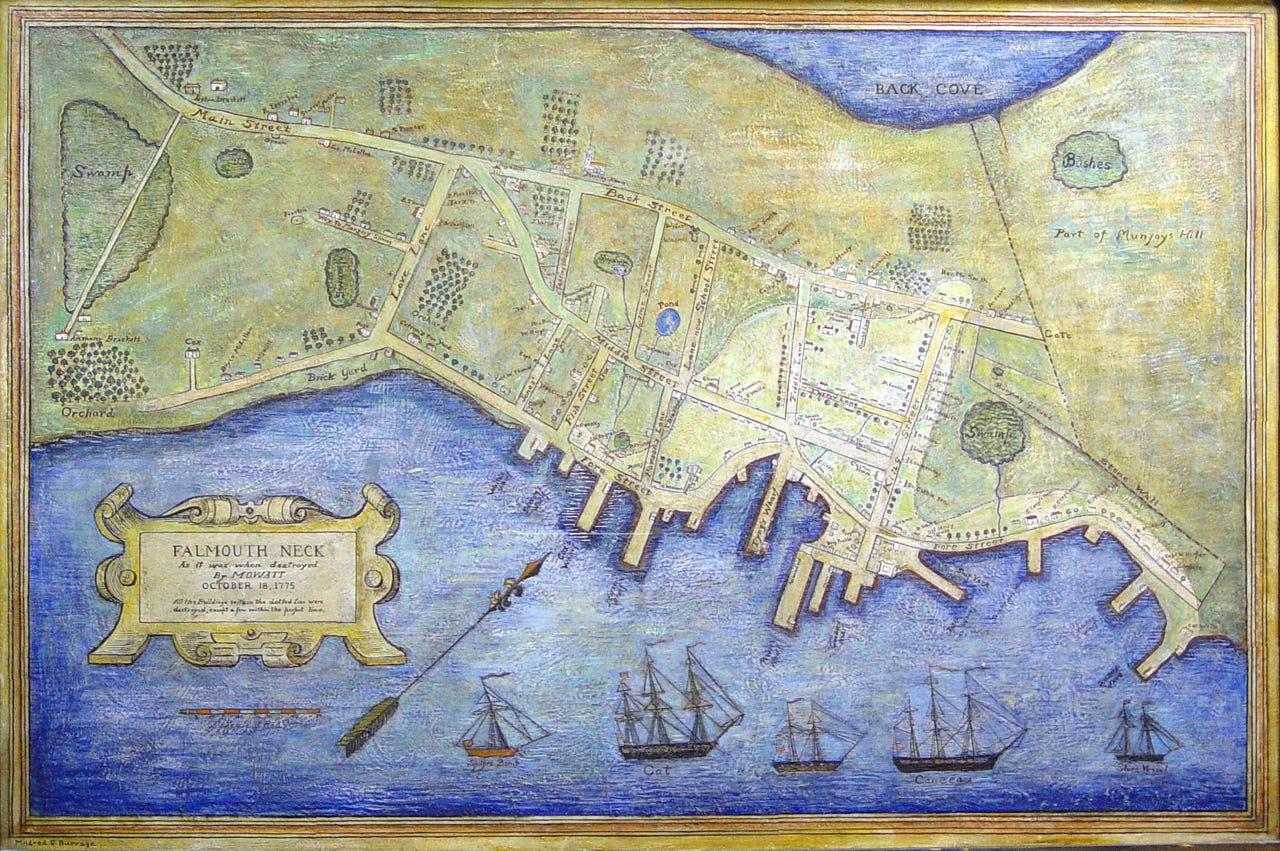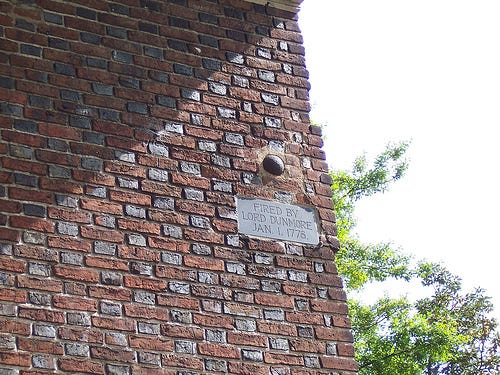When the Enemy Targeted George Washington's House
You know it's war when the leader's house is in the crosshairs.
I’ve been a little quiet on substack for the past three weeks, mostly because I have been immersed in editing a manuscript for a book called War of Lies, when George Washington was the target and propaganda was the crime.
Below is an exclusive sneak peek for War of Lies. While the propaganda plot from the book is not the focus of this article, two of the suspects behind the propaganda war against George Washington are mentioned in this article.
Virginians during the Revolutionary War believed that their government’s actions had led to “increased insult, oppression and a vigorous attempt to effect their total destruction.” To me, this sentiment resonates with the recent news of the U.S. Senate approving the hiring of 87,000 IRS agents. This number is too large to be confined to the targeting of billionaires and will have the effect of targeting average Americans.
Likewise, yesterday, the FBI raided Mar-a-Lago, the Florida home of President Donald Trump. This is the first time the current U.S. president has used the FBI to raid the home of a political opponent. Did King George III or one of his minions go that far? Read more to find out.
You know it’s war when the enemy targets the leader and his house.
Targeting Washington’s Mount Vernon
“An express just arrived from General Washington, camp at Cambridge, Oct. 24, 1775,” the article in James Rivington's New York Gazetteer began. “Enclosed information being of the highest importance, I thought it proper to transmit it to you with all dispatch, I am, sir, your obedient servant, George Washington, on service of the services of the united colonies.”
By using the phrase united colonies, Washington reinforced the Continental Congress’s goal for unity of America. The name United States had not yet been born.
Under Washington’s dispatch, the newspaper editor printed the enclosure that Washington had received from a witness in Falmouth, Massachusetts. In October 17, 1775, a British ship with sixteen guns, a schooner, and an armed sloop had arrived at Falmouth. The next morning, the captain of this small fleet announced that he would save the town if the townspeople gave up all of their guns and ammunition.

When the people refused, the captain initiated his orders. Within five minutes, his ships had fired on several houses. They were instantly ablaze.
“He continued firing till after dark the same day, which destroyed the largest part of the town.” This British captain “was ordered to set fire on all the seaport towns between Boston and Halifax and that he expected New York was to be burnt next.”
Mount Vernon, Washington’s home, was feared to be on another similar list down South.
While Washington was trying to turn groups of militias into the Continental Army in Cambridge, Massachusetts, in 1775, his distant cousin, Lund Washington, oversaw Mount Vernon in his absence.
In early October, Cousin Lund wrote Washington about the threat that Virginia’s Governor, John Murray, the 4th Lord Dunmore, posed to Mount Vernon. Since the summer, Dunmore had taken refuge aboard the HMS Fowe.
Sending raiding parties up and down the main rivers of Virginia, Dunmore had ordered his men to target the estates owned by rebels. Because of Washington’s new status as commander of the Continental Army, many feared that Dunmore would attack Mount Vernon and kidnap Washington’s wife, Martha.
“Tis true many people have made a stir about Mrs. Washington’s continuing at Mount Vernon but I cannot think her in any sort of danger,” Lund assured Washington on October 5, 1775.
While explaining the source of the rumors, he noted that Washington’s brother Jack had been alarmed.
“Mr. John Augustine Washington wrote to press her to leave Mount Vernon—she does not believe herself in danger, nor do I.”
Lund concluded that if they attempted “to take her in the dead of night they would fail, for ten minutes’ notice would be sufficient for her to get out of the way.”
One reason for Lund’s doubt was integrity. He believed that someone who was with the loyalist governor wouldn’t let him harm Martha.
“Lord Dunmore will hardly venture himself up this river, nor can I think he will send upon that errand surely her old acquaintance the attorney (who with his family are aboard his ship) would put him off doing an act of that kind.”
Rumored to be on board Dunmore’s ship was Thomas Jefferson’s older cousin, Virginia’s Royal Attorney General, John Randolph, who owned a large estate in Williamsburg, Virginia. John Randolph’s brother Peyton had served as attorney general in the 1750s. Generations of the Randolph family had long known Martha’s family because Martha’s great-grandfather had been a rector at Williamsburg’s Bruton Parish Church.
John Randolph had also recently defended his honor in a newspaper. He had denied accusing Patrick Henry, a known local patriot, of robbing local merchants. After his feud with Henry became public and because the British crown paid his salary, Randolph realized that he could no longer stay in America. He’d put his house up for sale and fled Williamsburg with his wife and daughters.
“I am sorry the situation of our country should render it not eligible to you to remain longer in it,” Thomas Jefferson had written to Cousin John on August 25, 1775.
Randolph’s story revealed the civil-war-like nature of the American Revolution. In July 1775, John’s son Edmund had joined George Washington as an aid on Jefferson’s recommendation. In contrast to his father, Edmund shared the politics of his father’s brother Peyton. Turning into a patriot and serving as the president of the first Continental Congress a year earlier, Peyton died of a sudden stroke in October 1775.
With so many patriot connections in his family, would the loyalist John Randolph, who was known for his integrity and gentleness, convince Lord Dunmore to leave Martha alone? Would all of these ties be strong enough to protect Martha and Mount Vernon? Lund believed John Randolph would prevent Dunmore from harming Martha and Mount Vernon. Nonetheless, Lund remained watchful.
“I have never advised her to stay nor indeed to go . . . you may depend I will be watchful and upon the least alarm persuade her to move,” Lund told Washington.
Vigilance and integrity won the day.
As the New Year of 1776 approached, Lord Dunmore had spared Mount Vernon while Martha had courageously traveled to Cambridge to be with Washington. The Royal Governor of Virginia did not show the same courtesy for the shipping town of Norfolk. On January 1, 1776, Dunmore fired on the coast of Norfolk, Virginia. Buildings caught fire, which spread and burned the town.
Viewing the burning of towns as acts of war, Washington hoped these atrocities would motivate his countrymen.
That it “will have no other effect than to unite the whole country in one indissoluble band against a nation which seems to be lost to every sense of virtue, and those feelings which distinguish a civilized people from the most barbarous savage,” Washington wrote to his aide, Joseph Reed, on January 31, 1776.
Two weeks earlier, Thomas Paine had anonymously published his pamphlet Common Sense in Philadelphia. Washington had already read it.
“A few more of such flaming arguments as were exhibited at Falmouth and Norfolk, added to the sound doctrine, and unanswerable reasoning contained Common Sense, will not leave numbers at a loss to decide upon the propriety of a separation,” he told Reed.
Indeed, the attacks on the patriots by Lord Dunmore culminated in May 1776, when a convention of Virginians met. These patriots concluded that Lord Dunmore, King George III, and Parliament had responded to their petitions, protests, and objections with “increased insult, oppression and a vigorous attempt to effect their total destruction.” Seeing no other option, they then authorized their delegates to the Continental Congress to support declaring independence from England.
I’m thinking of adding a paid subscription component to my substack to raise money for marketing of War of Lies once it is published. A complaint many authors have is that publishers don’t do enough on the marketing front and new solutions and publishing models are needed. So more to come on this idea. Below is more about my published book, Stories of Faith & Courage from the Revolutionary War.







